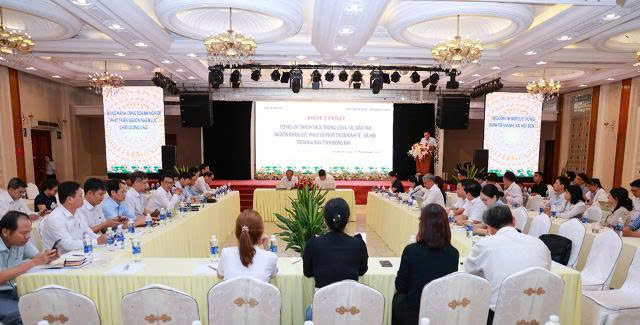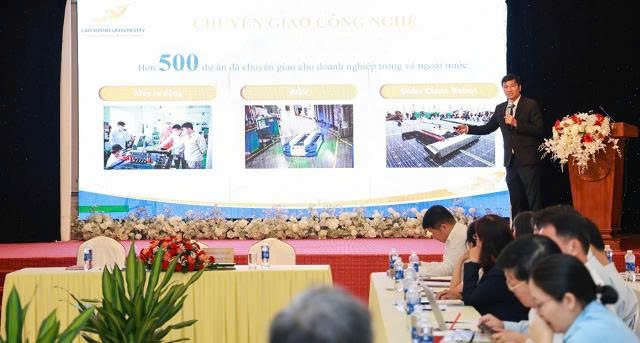Curriculum
CONTENTS
Strategic training partnerships, human resource development, and promoting socio-economic development in Dong Nai province.
On June 30, 2025, at the conference “Opportunities and Challenges in Human Resource Development for Socioeconomic Growth in Dong Nai Province,” with the participation of 41 educational institutions, government agencies, and prominent enterprises, Lac Hong University (LHU) reaffirmed its pioneering role in practice-oriented education—contributing significantly to the province’s sustainable development agenda.

View of delegates attending the conference
Practice-Based Education: A Proven Model for Sustainable Workforce Development
Speaking at the conference, Assoc. Prof. Dr. Nguye Vu Quynh, Vice President of Lac Hong University (LHU), emphasized the long-standing institutional strategy: “Practice-Integrated Education – Training Based on Real Needs.”
With over 1,057 industry partners, including 200 active collaborators annually, LHU has successfully implemented advanced educational models such as dual training programs, on-site enterprise-based learning, and deep partnerships in key engineering disciplines—including semiconductor design, mechatronics, logistics, and automation.
These strategic collaborations have yielded measurable outcomes:
-
100% of LHU graduates are employed within one year, and
-
Over 2,000 students participate in enterprise internships annually, receiving direct evaluations from corporate supervisors.
These compelling figures underscore that LHU’s enterprise-linked education is not a slogan, but a sustainable, results-oriented strategy aligned with the broader socioeconomic development goals of Dong Nai Province. The model generates mutual value for learners, higher education institutions, and local economic ecosystems alike.
Strategic cooperation among three pillars
Building on its field-tested experience, LHU proposes that Dong Nai establish a provincial Human Resource Development Council to enhance cooperation between the government, academia, and business sectors. The university also recommends creating a provincial Center for Employment, Internship, and Vocational Skills Connectivity, alongside a robust demand-driven training framework aligned with the province’s economic priorities.
LHU’s experience confirms that developing a high-quality workforce cannot be achieved in isolation from real-world enterprise practice—nor can it rely solely on standardized curricula. A tightly-knit ecosystem among stakeholders is essential for forming resilient human capital in the digital transformation era.
This perspective aligns with Resolution 57-NQ/TW of Vietnam’s Politburo on "breakthroughs in science, innovation, and digital transformation linked to high-quality human resources"—reinforcing the importance of academic contributions to inclusive, long-term sustainability.
Long-Term Commitment to Sustainable Impact
Under the guiding philosophy “Integrating Practice – Training from Demand,” Lac Hong University is steadfast in its commitment to accompanying Dong Nai’s strategic plan for human capital development. The university aims to nurture a new generation of professionals—technically competent, adaptable, and globally competitive, contributing meaningfully to the province’s sustainable and prosperous future.

“The tri-sector partnership is not merely a model—it is a practical solution for developing high-quality human resources that meet the sustainability goals of Dong Nai Province.”
— Assoc. Prof. Dr. Nguyen Vu Quynh, Vice President, Lac Hong University

